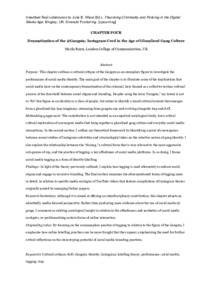Dramatization of the @GANGSTA: Instagram cred in the age of glocalized gang culture
Bozzi, Nicola 
![Accepted book chapter [thumbnail of Accepted book chapter]](https://gala.gre.ac.uk/47818/7.hassmallThumbnailVersion/47818_BOZZI_Dramatization_of_the_%40GANGSTA_Instagram_cred_in_the_age_of_glocalized_gang_culture.pdf)  Preview |
PDF (Accepted book chapter)
47818_BOZZI_Dramatization_of_the_@GANGSTA_Instagram_cred_in_the_age_of_glocalized_gang_culture.pdf - Accepted Version Download (321kB) | Preview |
Abstract
Purpose: This chapter outlines a cultural critique of the Gangsta as an exemplary figure to investigate the performance of social media identity. The main goal of the chapter is to illustrate some of the implications that social media have on the contemporary dramatization of the criminal, here framed as a collective techno-cultural process at the threshold between social stigma and branding. Despite using the term “Gangsta,” the author’s intent is not to “fix” this figure as an identity or a class of people, but rather to identify a broad cultural context that emerges from a glocalized hip-hop imaginary, stemming from gangsta rap and evolving alongside trap and drill.
Methodology/approach: The contribution is not intended as an empirical sociological study, but a critical cultural exploration of convergent media that bring together a glocalized gang culture and everyday social media interactions. In the second section, the author outlines his theoretical framework by identifying a point of convergence between recent studies of Instagram celebrities and criminological takes on the selective nature of gang identity. The author also explores the relationship between the “dissing,” a cultural form that is very relevant to the more aggressive sub-genres of rap, and the practice of tagging, a key affordance of social media platforms. In so doing, the author frames social media tagging as a form of identity labeling.
Findings: In light of the theory previously outlined, the author explains how tagging is used alternately to enforce social stigma and engage in recursive branding. The final section examines the aforementioned forms of tagging more in detail, in relation to specific media ecologies of YouTube videos that feature compilations of Instagram Stories originally posted by emerging Italian rappers.
Research limitations: Although it is aimed at offering an interdisciplinary contribution, this chapter adopts an admittedly media-focused perspective. Rather than producing more evidence about the use of social media by gangs, the author comments on existing sociological insight in relation to the affordances and esthetics of social media ecologies, re-problematizing certain forms of online interaction.
Originality/value: By focusing on the commonplace practice of tagging in relation to the figure of the Gangsta, the author emphasizes how online labeling practices can be more fraught that they appear, emphasizing the need for further critical reflections on the stereotyping potential of social media branding practices.
| Item Type: | Book Section |
|---|---|
| Uncontrolled Keywords: | cultural critique; drill; gangsta; identity; Instagram; labeling theory; performance; social media; tagging; trap |
| Subjects: | H Social Sciences > H Social Sciences (General) N Fine Arts > N Visual arts (General) For photography, see TR N Fine Arts > NC Drawing Design Illustration |
| Faculty / School / Research Centre / Research Group: | Faculty of Liberal Arts & Sciences Faculty of Liberal Arts & Sciences > School of Design (DES) |
| Related URLs: | |
| Last Modified: | 19 Sep 2024 13:01 |
| URI: | http://gala.gre.ac.uk/id/eprint/47818 |
Actions (login required)
 |
View Item |
Downloads
Downloads per month over past year
 Tools
Tools Tools
Tools